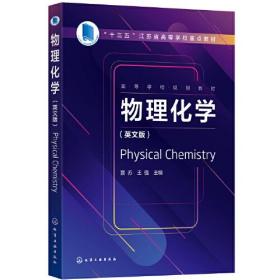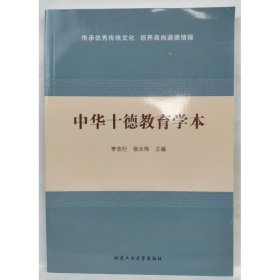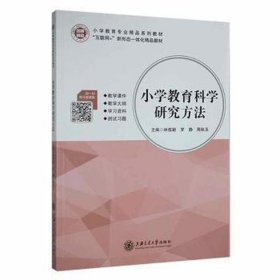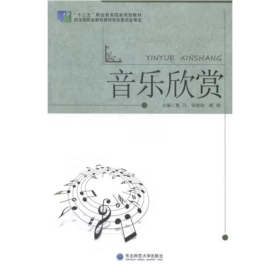
物理化学(Physical Chemistry)(景苏)
正版二手,均有笔记不影响使用,无赠品、光盘、MP15363等。如需购买套装书,请联系客服核实,批量上传数据有误差,默认一本,套装书售后运费自理,还请见谅!
¥ 8.88 1.8折 ¥ 49.8 八五品
库存130件
山东枣庄
认证卖家担保交易快速发货售后保障
作者王强 主编;景苏
出版社化学工业出版社
出版时间2021-07
版次1
装帧平装
货号9787122385390
上书时间2024-11-05
- 最新上架
商品详情
- 品相描述:八五品
图书标准信息
- 作者 王强 主编;景苏
- 出版社 化学工业出版社
- 出版时间 2021-07
- 版次 1
- ISBN 9787122385390
- 定价 49.80元
- 装帧 平装
- 开本 16开
- 纸张 胶版纸
- 页数 280页
- 字数 470千字
- 【内容简介】
-
《物理化学(英文版)Physical Chemistry》为“十三五”江苏省高等学校本科重点教材(新编)。本书是在继承既有物理化学中文、英文教材体系成果的基础上编写而成的,在“新工科”理念指导下,注重借助数学、物理等基础科学的理论原理及新实验技术手段研究化学变化中的基本规律。本书共包括九章内容,分别是气体的性质、热力学定律、热力学第二定律、多组分系统热力学、化学平衡、相平衡、电化学平衡、化学动力学和界面化学,每章均配有与章节基本概念、公式和知识内容相对应的不同难度的例题、练习题和思考题,有助于巩固掌握基础知识,增强解题及逻辑思维能力。
本书注重提高学生的学习兴趣和效果,培养多学科基础厚实、工程能力强、综合素质高且能实现跨界整合的复合型人才。本书既可作为高等院校化工类、化学类、材料类、生工制药类、环境类等专业基础物理化学课程的全英文教学用书,也可供其他相关专业使用,并可作为相关科研和工程技术人员的参考用书。 - 【目录】
-
Chapter 1 The Properties of Gases 1
1.1 State Equation of the Ideal Gas 1
1.1.1 Empirical Laws of Gases 1
1.1.2 State Equation of Ideal Gas 2
1.1.3 Model and Definition of Ideal Gas 4
1.2 The Properties of Mixtures of the Ideal Gases 5
1.2.1 Composition of Mixtures 5
1.2.2 Dalton’s Law of Partial Pressures 6
1.2.3 Amagat’s Law of Partial Volumes 7
1.3 State Equations of Real Gas 8
1.3.1 The van der Waals Equation 8
1.3.2 Generalized Equation of State for Real Gases 9
1.4 Isothermal Curves and Liquefaction of Real Gas 10
1.4.1 Saturated Vapor Pressure of the Liquid 10
1.4.2 Isothermal Curves and Liquefaction 12
1.4.3 Critical Parameters and Critical Compression Factor Zc 14
1.5 Exercises 15
Chapter 2 The First Law of Thermodynamics 17
2.1 Basic Concepts 17
2.1.1 System and Surroundings 17
2.1.2 Property, State, and State Function 18
2.1.3 Process and Route 19
2.1.4 Work, Heat, and Energy 20
2.2 The First Law of Thermodynamics 22
2.2.1 The First Law of Thermodynamics 22
2.2.2 Internal Energy 23
2.3 Heat, Enthalpy, and Heat Capacities 23
2.3.1 Heat in Isochoric Conditions, and Internal Energy 23
2.3.2 Heat in Isobaric Conditions, and Enthalpy 25
2.3.3 Hess’s Law 26
2.3.4 Heat Capacities 27
2.4 Pressure-Volume Work and Reversible Processes 29
2.4.1 Pressure-Volume Work 29
2.4.2 Reversible Processes 30
2.5 Isoenthalpic Processes 36
2.5.1 The Joule-Thomson Effect 36
2.5.2 Adiabatic Joule-Thomson Coefficient 37
2.6 Thermochemistry 37
2.6.1 Standard Enthalpy of Formation 38
2.6.2 Enthalpy of Reaction 39
2.6.3 Temperature-Dependence of Standard Enthalpy of Reaction 40
2.7 Exercises 41
Chapter 3 The Second Law of Thermodynamics 42
3.1 Statements of the Second Law of Thermodynamics 42
3.1.1 Spontaneous Process 42
3.1.2 Conversion of Heat and Work 43
3.1.3 Statements of the Second Law of Thermodynamics 43
3.2 Carnot Cycle and Carnot Theorem 44
3.2.1 Carnot Cycle 44
3.2.2 Carnot Theorem 45
3.3 Entropy and Clausius Inequality 46
3.3.1 Derivation and Definition of Entropy 46
3.3.2 The Clausius Inequality 47
3.3.3 The Principle of the Increase of Entropy 47
3.3.4 Physical Significance of Entropy 48
3.4 The Calculation of Entropy Changes 49
3.4.1 The Calculation of Entropy Changes in Simple pVT Process 49
3.4.2 The Calculation of Entropy Changes for Phase Changes 51
3.5 The Standard Molar Reaction Entropy Change of Chemical Reaction 52
3.5.1 The Third Law of Thermodynamics 52
3.5.2 Absolute Entropy and Standard Molar Entropy of Matter 52
3.5.3 Calculation of Entropy Changes for Chemical Reactions 53
3.6 The Gibbs and Helmholtz Functions 55
3.6.1 Helmholtz Function 55
3.6.2 Gibbs Function 56
3.7 The Calculation of ΔA and ΔG 57
3.7.1 Simple pVT Change Process 57
3.7.2 Phase Change Processes 57
3.7.3 Chemical Change Processes 58
3.8 The Fundamental Equation of Thermodynamics 59
3.8.1 The Fundamental Equations of Thermodynamics 59
3.8.2 The Relations of Characteristic Function 60
3.8.3 The Maxwell Relations 61
3.9 The Application of the Second Law of Thermodynamics in the Phase Equilibria of Single Component Systems 62
3.9.1 The Clapeyron Equation 62
3.9.2 The Clausius-Clapeyron Equation 63
3.9.3 The Effect of Total Pressure on the Vapor Pressure 64
3.10 Exercises 65
Chapter 4 The Thermodynamics of Multi-Component Systems 68
4.1 Composition scale of multi-component systems 68
4.1.1 Mass Concentration 68
4.1.2 Amount of Substance concentration 68
4.1.3 Molality 69
4.2 Partial Molar Quantities 69
4.2.1 Definition of Partial Molar Quantity 70
4.2.2 Collected Formula of Partial Molar Quantity 71
4.2.3 The Gibbs-Duhem Equation 71
4.3 Chemical Potential 72
4.3.1 Definition of Chemical Potential 72
4.3.2 Equilibrium Criterion of Material 73
4.3.3 Application of Chemical Potential in Phase Equilibrium 74
4.4 Chemical Potential of Gas 75
4.4.1 Chemical Potential of a Pure Ideal Gas 75
4.4.2 Chemical Potentials in an Ideal Gas Mixture 76
4.5 Raoult’s law and Henry’s law 77
4.5.1 Raoult’s Law 77
4.5.2 Henry’s Law 78
4.5.3 Comparison of Raoult’s Law and Henry’s Law 79
4.6 Mixture of Ideal Liquid 79
4.6.1 Definition and Features of Mixture of Ideal Liquid 79
4.6.2 Chemical Potential of Arbitrary Component in Mixture of Ideal Liquid 80
4.6.3 Mixing Properties of Mixture of Ideal Liquid 81
4.7 Ideal Dilute Solution 82
4.7.1 Definition of Ideal Dilute Solution 82
4.7.2 Chemical Potential of the Solvent and Solute in Ideal Dilute Solution 82
4.8 Real Liquid Solution 83
4.8.1 The Solvent Activity 83
4.8.2 The Solute Activity 84
4.9 Colligative Properties 84
因字数限制,仅展示部分目录
点击展开
点击收起
— 没有更多了 —












以下为对购买帮助不大的评价